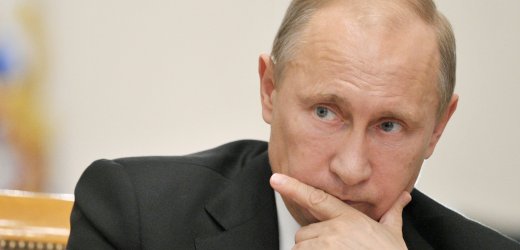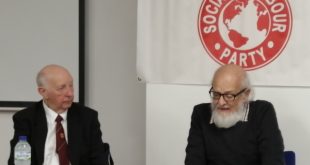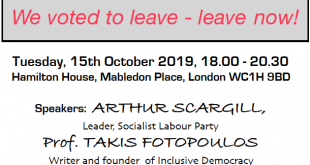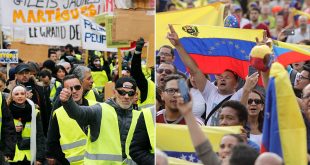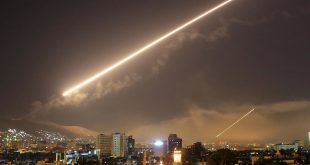TAKIS FOTOPOULOS
(22.12.2014)
Abstract : The article examines the options available to Russia, so that not only the present frontαl attack by the TE against it is repealed but also the conditions are created that could secure its economic and national sovereignty, which will may make it invulnerable to similar economic warfare against it in the future. It is found that there are three basic options available, depending on the method of allocation of economic resources chosen, in effect, the form of the economy selected, i.e. a) continuing the present catastrophic process of fully integrating the country into the NWO, b) creating a non-market economy outside the NWO or, alternatively, c) An intermediate socially-controlled market economy, which is considered here the only feasible solution under the present conditions.
It is generally acceptable today (at least among all those not belonging to the academic and media network of the TE ―i.e. the Transnational Elite, which consists, mainly, of the elites based in the G7 countries― and the fellow travellers in the liberal “Left” and the Russian elite, that is, “the fifth column”), that Russia faces today a full frontal general attack. An attack by the TE aiming at the subordination of Russia to the New World Order (NWO) of neoliberal globalization. This is indicated by the concerted attack at the economic, as well as the political, military and propaganda fronts, and confirmed also by President Putin’s recent major interview[1]. So, what are the options available to Russia in order not only to face this attack but also to create the conditions that could secure its economic and national sovereignty and will make it invulnerable to similar future economic warfare against it which is, as I wrote recently,[2] the main form of warfare used by the TE? As I will try to show, the answer to this question crucially depends on the very method chosen to allocate economic resources and the related socio-economic changes. We may therefore distinguish between three basic options depending on the method of allocation of economic resources, in effect, the form of the economy chosen.
1. A Market economy integrated into the NWO
The present free market policies that the globalists within the Russian elite (who seem to control the main economic institutions of the country) implement are based on the assumption that the use of the neoliberal economic tools, which are mainly of monetary nature (interest rates, central bank operations etc.) with respect to the supply of and the demand for the ruble, perhaps accompanied with administrative measures to punish speculators, will eventually stabilise the value of the currency. However, this is a policy (if one is justified to call it a policy), that, at most, can relieve some of the symptoms of the present crisis, not the causes of it. It’s like an aspirin used to bring down the patient’s fever. A stabilisation of the price of oil at $60 or below in the coming year and a corresponding stabilisation of the value of the currency at the present very low levels, which could well lead to the loss of more than a third of its value than a year ago, is of course no good for a country that heavily depends on imports to cover even the basic needs of its people. In other words, the combination of a very low price of oil with a drastic depreciation of the currency is bound to lead to a corresponding drastic fall in real incomes, i.e. the purchasing power of wages and salaries. So, the longer the engineered dramatic fall in the price of oil lasts, and the economic sanctions against Russia continue, the more dramatic the social and economic effects.
Furthermore, import substitution policies in order to restructure the production structure, from one dependent on imports for almost everything to a more self-reliant economy with a significant export sector exporting a variety of commodities, presuppose mass investment in research and development, as well as major productive investments not just in infrastructure, which mainly helps trade, but principally in the primary and secondary sectors. However, such mass investment cannot simply be left to private capital, domestic or foreign. The criteria for private investment are very different from those of social investment. The main criterion of private investment is profitability and growth, whereas the main criterion of social investment is the best satisfaction of social needs in a way that protects both labor and the environment. Furthermore, Transnational Corporations (TNCs) are attracted to invest only if they have secured a high profit rate for their operations, e.g. because of a much lower comparative cost of production (i.e. slave labor, low corporation tax rates, minimal social controls for the protection of labor and the environment e.tc.) than in other competing countries. This was the case of the massive outflow of investment capital in the past two decades from the “North” to the “South” (mainly the BRICS countries) causing de-industrialisation in the former and the supposed economic ‘miracles’ in the latter.
In the case of Russia today, there are additional reasons why such mass investment to restructure its productive structure cannot be left to foreign capital, whether borrowing capital or investment capital. The former is ruled out because of the strict sanctions imposed by the TE and the latter by an informal ‘investment strike’ on behalf of TNCs. Clearly, the TNCs that dominate the economic and political elites in the TE have no reason at all to start investing in Russia, whatever the incentives offered by it, if the strategic aim of the TE at the moment is to subordinate Russia and convert it into a non-sovereign economic ‘partner’, like China or India.
As Putin rightly perceived in his press conference, Russia pays the price for not willing to be a subordinate member of the TE, as are the other BRICS countries. In fact, Russia pays a high price not only because it did not show any willingness to submit on Ukraine but also because it continues its systematic effort to advance the Eurasian Union, as an alternative pole of sovereign nations. Thus, as Hilary Clinton warned, long ago:
“The US is trying to prevent Russia from recreating a new version of the Soviet Union under the ruse of economic integration…There is a move to re-Sovietise the region…It’s not going to be called that. It’s going to be called a customs union, it will be called Eurasian Union and all of that…But let’s make no mistake about it. We know what the goal is and we are trying to figure out effective ways to slow down or prevent it.”[3]
Then, a very recent Times leader was very frank in revealing the direct connection between the Russian economic crisis and Ukraine and also in showing what Putin has to do, if he wants to see the crisis immediately resolved:
“What is clear is that Russia is acutely vulnerable to oil price fluctuations because Mr Putin has not done nearly enough to diversify its economy. As growth has slumped, he has turned to foreign adventurism to distract voters, who are paying dearly. It is not too late to ease their burden by withdrawing unconditionally from Ukraine.”[4]
Needless to add that the creation of new markets of oil and corresponding distribution networks (China, Turkey etc.) may be significant in securing markets but are relatively insignificant with respect to the above effects of the present crisis engineered by the TE in Russia. The new business partners of Russia obviously are not going to pay a higher price than the world price, which is determined at the end by the client Gulf states and the TE. Even if Russia together with these countries create a new currency of their own, e.g. on the basis of the value of a basket of BRICS currencies, one can bet that the price of oil and gas may indeed be converted into the new currency instead of the US dollar, but at values which would reflect the US dollar value of oil, particularly when the price offered by Russia is higher than the world price. Clearly, a business partnership, as the present Russia-BRICS relationship is, does not make, by itself, an alliance!
The conclusion is that as long as Russia is integrated into the NWO, which is run by the TE, it will have to be a subordinate member of it, as the other BRICS countries are, whose economic policies are not determined by their own governments but by the “markets”, i.e. the TNCs, which control these markets. None of the BRICS countries, for instance, is able to impose any effective social controls in their markets to protect labor or the environment, as they are well aware that they will face immediate economic and/or military violence to change their minds. Russia as well as other regimes that attempted in the past to resist the TE (Yugoslavia, Iraq, Libya, Syria, Iran and so on) are well aware of this basic ‘fact of life’ in the NWO of neoliberal globalization, which illustrates how capitalist market economies work today.
2. A non-market economy outside the NWO
The second option is a radical one, which presupposes the discarding of the market system altogether as a method of allocating economic resources. The rationale behind it is that the market system deprives society of its ability to determine collectively the economic process and leaves it instead to the supposed invisible hand of the market which, as the evolution of this system has showed, inevitably leads to growing concentration of income and wealth (and therefore economic and political power) in the hands of a few. This is inevitable, because the growing concentration of wealth/income is built into the grow-or-die logic of the capitalist market system. In fact, the market system, far from being the perfect method for allocating resources as advertised by its ideologues, it can be shown that it is the worst, both theoretically and historically.[5] This is not only because of its endemic catastrophic crises but, even more important, because it eventually leads to highly unequal societies and economies, which also destroy the environment—all in the name of profit.
The socialist economy was an attempt to restore social control on the economic process, i.e. in giving answers to the fundamental economic questions every society faces, as first year economics students used to learn: what to produce, how to produce it and for whom. The form of society, in which the economy is collectively controlled and in a position to determine what needs to be met and how on the basis of the existing resources, represents in fact a form of social liberation, and the 1917 Russian revolution represented exactly such an attempt for social liberation. Unfortunately, for reasons I examined elsewhere,[6] the method of allocating resources on the basis of central planning, which was aimed to implement the project for collective social control of the economy, although much more successful than the market system with regard to the satisfaction of the basic needs of all citizens (rather than only those with thick wallets, as in capitalist societies) failed because of its highly non-democratic nature. Not in the sense of political democracy, as in fact no representative “democracy” is a real democracy and surely does not become one just because it manages to disguise better than any other kind of political regime the huge concentration of power going on in it, through its very institutional framework. But, mainly, in the sense that it was not an economic democracy either, as it promised to be, in the sense of citizens as workers, employees, as well as consumers taking the fundamental economic decisions, which, instead, were taken by various bureaucracies. However, this does not mean that it is inconceivable to create a different form of a socially (i.e. collectively) controlled economy, where it is the assemblies of citizens as producers and consumers, which take all fundamental economic decisions in the context of a real economic democracy.[7]
Such an alternative economy will face of course an even worse kind of attack by the NWO and the TE than Russia faces today. Furthermore, it is impossible to be built today by any people on earth who is not sovereign, i.e. who does not control its economy and therefore cannot have any real national sovereignty, let alone economic sovereignty. In other words, social liberation today inevitably passes through national liberation. This is why the present social struggle cannot just be a struggle for social liberation, as paleolithic Marxists, anarchists et al suggest, but it has to be also one for national liberation as well.
3. An intermediate socially-controlled market economy
If therefore the continuation of the present system of free and liberalized markets is catastrophic for all peoples in the world, apart from a small minority of the world population who benefit from neoliberal globalization, and the immediate creation of an alternative socially-controlled economy is ruled out at the moment for the reasons mentioned above, the crucial issues faced by Russia today, and particularly the answers it will give to them, are important for any people in the world fighting for its liberation.
But, what Russia can do, so that not only it can transcend the present crisis, which is far from temporary as long as it does not control the economic process and also does not create the conditions for real national sovereignty, which are also the preconditions for social liberation? Assuming that neither the present system of allocating resources can secure real sovereignty, nor the subjective and objective conditions for an alternative system are present at the moment, the only feasible solution today is, to my mind, an intermediate one. That is, one between the two systems, which implies a socially controlled market economy that will not, however, be a repetition of the failed social democracy of the immediate post-war period. I will describe briefly below the main steps that have to be taken in this direction in the short and medium to long term.
The immediate measures that should be taken in this process may be described as follows:
- the unilateral exit from the World Trade Organization, the IMF and similar TE-controlled institutions, which will create the necessary conditions for economic and national sovereignty;
- The annulment of any legislation aiming at further opening and liberalizing of markets, privatizations and other similar ‘structural reforms’, which have been imposed by the Transnational Elite through the above institutions; markets should be amenable to social control for the protection of labor, the environment and the national economy, from the workings of the markets themselves;
- The cancellation of sell-outs of social wealth to local oligarchs or TNCs;
- The imposition of strict social controls on all markets (commodities, labor and capital). Basic social needs have to be covered by a socialized (not just nationalized) new sector in which private business activity will be ruled out. This sector should be run by the assemblies of workers in the social services under the guidance of the Government and local authorities, which will fund these services out of a steeply progressive taxation system;
- Re-designing of the wider public sector, which includes the industries covering non-basic social needs (banking, energy, transport, communication and so on) which could be run by public sector workers and representatives of citizens’ assemblies representing consumers, under general government guidance;
- Guaranteeing full employment for all citizens as well as a minimum income for all (covering at least the survival needs for food, clothing, housing etc.) through heavy taxation on the privileged social groups (following a proper census of all their wealth and incomes, including deposits abroad);
- Finally, a necessary condition for the implementation of all these measures in the short-term, as well as of the measures described below to be taken in the medium to long term, is the radical change of geopolitical relations, so that the ‘Libyan’ or ‘Ukrainian’ examples are not repeated in the countries moving away from the NWO in general. This presupposes the creation of an international political and economic union of all countries presently resisting the NWO, which will be willing to adopt a program like the one described here. This could be an expanded Eurasian Union of sovereign nations that will adopt the above measures and could include countries well beyond the Eurasian area resisting the NWO, i.e. from Venezuela and Bolivia up to the countries in the EU periphery that will break with the EU, and the peoples in the Middle East (Syria, Iran and others).
The medium term measures should be aimed at re-building the production and consumption structures, so that a self-reliant economy could emerge. The aims of the measures to be taken during this period could be the following:
- Regenerating the primary sector and revitalizing the countryside in general, through heavy subsidization of farming, so that a self-reliant primary sector covering most primary needs could be created; this development should be accompanied by the radical decentralization of social services, so that citizens, irrespective of where they live, could enjoy same quality free social services in Health, Education etc.;
- Creating an industrial sector that would be capable of meeting most basic needs of all citizens, and as many of their other needs through bilateral or multilateral imports financed by exports of surplus goods and services (including tourism);
- Inducing the emergence of a new production structure that encourages the development of a new consumption pattern, which would be determined by the values and needs of self-reliance and in accordance with the traditional cultural values of each people rather than by the values and needs of globalization. This implies, also, taking seriously into account the possible ecological implications, as well as the fact that most of the non-basic goods produced today cater for non-existent “needs” created by the TNCs themselves through marketing etc;
- Developing a mixed system of ownership of the means of production, ranging from small private ownership (e.g. farming, services) to various forms of collective ownership (from socialized industries e.g. in energy, communication, transport to co-ops e.tc) and demotic enterprises in which the people running them will be the workers employed by them, under the guidance of the demotic assemblies, i.e. the citizens’ assemblies in the municipalities where the enterprises are based and, last, but not least,
Establishing a new mixed system of allocation of resources for this transitional stage, which will consist of a combination of indicative planning (as distinguished from compulsory central planning), economic democracy and the market.
* The article was also published simultaneously in Pravda.ru. It was edited by Jonathan Rutherford.
[1] “Western nations want to chain ‘the Russian bear” – Putin, RT (18/12/2014).
[2] See “Economic warfare the main Western weapon”, Pravda.ru (6/12/2014).
[3] Charles Clover, “Clinton vows to thwart new Soviet Union”, The Financial Times (6/12/2012).
[4] Editorial, “Putin at bay”, The Times (17/12/2014).
[5] see Takis Fotopoulos, Towards An Inclusive Democracy, (London/NY: Cassell /Continuum, 1997/1998), ch. 1.
[6] see “The Catastrophe of Marketization”, Democracy & Nature, Vol. 5, No. 2 (July 1999), pp. 275-310.
[7] Towards An Inclusive Democracy, chs 5-6.
 ANTIGLOBALIZATION – SELF-RELIANCE – INCLUSIVE DEMOCRACY Building Popular Fronts for National and Social Liberation (FNSL): for a Democratic Community of Sovereign Nations towards an Inclusive Democracy
ANTIGLOBALIZATION – SELF-RELIANCE – INCLUSIVE DEMOCRACY Building Popular Fronts for National and Social Liberation (FNSL): for a Democratic Community of Sovereign Nations towards an Inclusive Democracy
